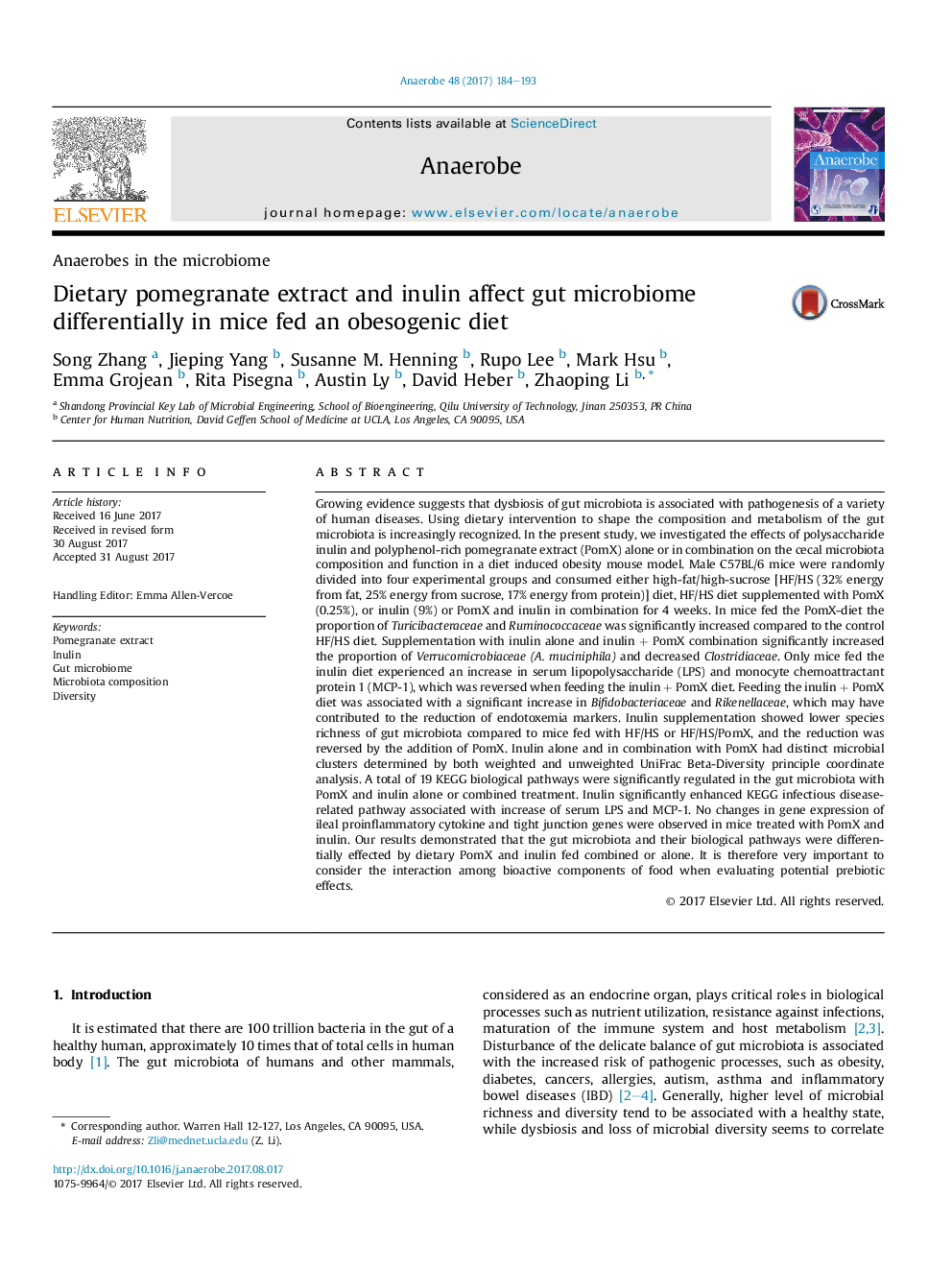| کد مقاله | کد نشریه | سال انتشار | مقاله انگلیسی | نسخه تمام متن |
|---|---|---|---|---|
| 5671339 | 1592816 | 2017 | 10 صفحه PDF | دانلود رایگان |
- Prebiotic oligosaccharide inulin and PomX polyphenols altered gut microbiota of mice fed an obesogenic diet differently.
- Dietary inulin decreased diversity of gut microbiota and increased serum LPS and MCP-1, indicating increased inflammation.
- Combination of inulin and PomX reversed changes induced by inulin alone on bacterial diversity, serum LPS and MCP-1.
Growing evidence suggests that dysbiosis of gut microbiota is associated with pathogenesis of a variety of human diseases. Using dietary intervention to shape the composition and metabolism of the gut microbiota is increasingly recognized. In the present study, we investigated the effects of polysaccharide inulin and polyphenol-rich pomegranate extract (PomX) alone or in combination on the cecal microbiota composition and function in a diet induced obesity mouse model. Male C57BL/6 mice were randomly divided into four experimental groups and consumed either high-fat/high-sucrose [HF/HS (32% energy from fat, 25% energy from sucrose, 17% energy from protein)] diet, HF/HS diet supplemented with PomX (0.25%), or inulin (9%) or PomX and inulin in combination for 4 weeks. In mice fed the PomX-diet the proportion of Turicibacteraceae and Ruminococcaceae was significantly increased compared to the control HF/HS diet. Supplementation with inulin alone and inulin + PomX combination significantly increased the proportion of Verrucomicrobiaceae (A. muciniphila) and decreased Clostridiaceae. Only mice fed the inulin diet experienced an increase in serum lipopolysaccharide (LPS) and monocyte chemoattractant protein 1 (MCP-1), which was reversed when feeding the inulin + PomX diet. Feeding the inulin + PomX diet was associated with a significant increase in Bifidobacteriaceae and Rikenellaceae, which may have contributed to the reduction of endotoxemia markers. Inulin supplementation showed lower species richness of gut microbiota compared to mice fed with HF/HS or HF/HS/PomX, and the reduction was reversed by the addition of PomX. Inulin alone and in combination with PomX had distinct microbial clusters determined by both weighted and unweighted UniFrac Beta-Diversity principle coordinate analysis. A total of 19 KEGG biological pathways were significantly regulated in the gut microbiota with PomX and inulin alone or combined treatment. Inulin significantly enhanced KEGG infectious disease-related pathway associated with increase of serum LPS and MCP-1. No changes in gene expression of ileal proinflammatory cytokine and tight junction genes were observed in mice treated with PomX and inulin. Our results demonstrated that the gut microbiota and their biological pathways were differentially effected by dietary PomX and inulin fed combined or alone. It is therefore very important to consider the interaction among bioactive components of food when evaluating potential prebiotic effects.
Journal: Anaerobe - Volume 48, December 2017, Pages 184-193
